- Home
- Barbara Pym
An Unsuitable Attachment Page 2
An Unsuitable Attachment Read online
Page 2
But she does, Mark thought, though he said nothing.
'"Oh, Mrs Ainger", I said, "you wouldn't want pussy going in your lounge, would you."' Sister Dew smiled up at Mark, for she was a little dumpy woman. Her prominent blue eyes, seeming to bulge with curiosity, met Mark's eyes, which were also blue, but with that remote expression sometimes found in the eyes of sailors or explorers. Although invariably kind and courteous he had the air of seeming not to be particularly interested in human beings — a somewhat doubtful quality in a parish priest, though it had its advantages.
'You'll find pussy going on the beds next,' Sister Dew went on. 'On the beds and in the lounge —you couldn't have that.'
Mark's smile did not reveal that Faustina naturally went on the beds as well as in the lounge. He was wondering if, strictly speaking, a vicarage could be said to have a lounge — he would have thought not. Sister Dew was a tedious little woman but she must be listened to because of all his parishioners she was the one most likely to take offence. She was a retired hospital nurse and Mark had often wondered why her noble profession, so intimately connected with the great events of life, should have made her so petty-minded. Perhaps it was their very greatness that made her so — one couldn't be noble all the time.
'How pretty those houses are,' said Mark, feeling that he ought to stay and talk to her a little longer. He was hungry and conscious of the delicious greasy bundle in his bag, but he believed fish and chips were usually heated up in the oven anyway, so they wouldn't spoil.
'Yes, and nice people coming to live in them.' She lowered her voice. 'I've heard this one we're standing by has been bought by a television producer. Associated Rediffusion,' she added reverently.
Mark puzzled over the words, but they meant nothing to him.
'And there's Miss Broome opposite, with the mauve front door — she's sweet, I think. Just the kind of person we want at St Basil's.'
Mark's face brightened for he remembered who Miss Broome was — a nice-looking youngish woman who had been to church the last two or three Sundays.
'Her mother was a canon's widow,' said Sister Dew, in her reverent Associated Rediffusion voice.
'So her father must have been a canon,' said Mark, though he felt that for some reason it was the canon's widow who cut more ice here. Since Miss Broome's parents were both dead, it could never be known how it had been in life.
'She's a librarian or something like that,' Sister Dew went on. 'And that lovely fur coat! Chinchilla, I would have said, but I suppose it couldn't be. Grey squirrel, more likely, though one doesn't see that much nowadays. Well, I mustn't keep you, vicar, or pussy will have something to say, won't she.'
Sister Dew scuttled off to her own house, which was at the as yet unfashionable end of the terrace, and Mark hurried along the short distance to the vicarage. Beyond it lay the Victorian Gothic church and some large houses of the same period, now mostly turned into flats.
Sophia was in the kitchen, laying the table for supper.
'What is chinchilla?' Mark asked, as he handed over the fish and chips.
'Why, a kind of fur, pale grey and very expensive — worn mostly by wealthy Edwardian ladies with a bunch of Parma violets and perhaps a toque.'
'Ah yes, the kind of hat your mother used to wear.'
'Why do you want to know about chinchilla? I can't believe you've come across any in Love Apple Road this afternoon.'
'It's the kind of fur Sister Dew thought Miss Broome's coat might be — but apparently it would be too expensive even for a canon's daughter.'
'Oh yes — but how well it would suit Ianthe Broome — she's just the type for chinchilla.'
'And so are you, darling,' said Mark. 'And all I bring you is fish and chips.'
Sophia had, in a sense, married beneath her, for although Mark came of a good clerical family he was without private means. Sophia's mother spoke in hushed tones of her son-in-law's parish — much too near the Harrow Road and North Kensington to be the kind of district one liked to think of one's daughter living in, though of course a vicarage was different. The clergy had to go to these rather dreadful places, but it was a pity Mark couldn't have got something 'better', like a Knightsbridge or South Kensington church, or even a good country living.
'I love fish and chips,' said Sophia warmly, 'and I think they're ready now.'
No sooner had the dish been taken from the oven than a tortoiseshell cat entered the room, and leapt, via Mark's knee, on to the table.
'You wouldn't want pussy on the table, as Sister Dew might say,' said Mark, making a feeble attempt to remove her.
'No, Faustina,' said Sophia more sternly. 'We do not leap on to the table for our food. We take it from our dish in the proper place.'
'But there is nothing in the dish,' Mark pointed out.
'No, but we must be patient,' said Sophia, helping the cat first. 'Whatever would Daisy and Edwin Pettigrew say if they could see such behaviour!'
The Pettigrews, brother and sister, lived next door to the vicarage. Edwin was a veterinary surgeon and Daisy looked after the animals who were sometimes boarded with them.
'Well, one naturally expects a cattery to be more austere,' said Mark. 'It must be like animals leading a monastic life.'
When they had washed up they went into the sitting room — neither 'lounge' nor 'drawing room' seemed right to describe it — and listened to a concert on the wireless, for they had no television set and no grateful parishioners had yet clubbed together to provide one. Mark thought out his letter for the October number of the parish magazine, while Sophia sorted out a basket of quinces which her mother had sent up from the country.
'I shall make jelly,' she said, 'and keep some on a dish here — they smell so delicious.' She sighed, not wanting to add that they reminded her of her childhood home in case Mark should be hurt. In these less gracious surroundings she had tried to recapture the atmosphere of her mother's house with bowls of quinces, the fragrance of well polished furniture, and the special Earl Grey tea, but she often realized how different it really was. The vicarage had been built to match the church and the style of the rooms had not yet, and perhaps never would, become fashionable again.
'How was Penelope?' Mark asked.
'Oh, much as usual. I helped her to choose a dress. And she was going for an interview for a new job tomorrow.' Sophia did not mention the unsuccessful love affair. Mark could not really enter into such things.
'I suppose her autumn social life will be starting,' he said absently, 'and I suppose the note of my October magazine letter ought to be something about the autumn and winter social activities,' he went on, taking up his pen again. 'And perhaps a welcome to the strangers in our midst?'
'Yes, that would be most appropriate,' said Sophia. She suspected that Mark was thinking of the West Indians who had come to live in the parish and of course that was very right. But she was thinking more of Ianthe Broome and the man she and Penelope had seen that afternoon, and wondering what they would be like. There was always that slight excitement and uncertainty about living in a London parish — one never knew who might turn up in church on Sunday.
2
Daisy Pettigrew changed her reading for her long distance glasses, so that she could see the vicarage garden more clearly. Sitting in her window, she commanded a good view of the vicarage garden and of the 'object' whose identity had been puzzling her for some days now. It looked like — and surely it was — a statue of the Virgin Mary, and before long, no doubt, it would find its way into the church among all the other statues, though why it was now in the garden puzzled her a little. Grey stone and blue drapery, she thought, the whole thing rather shabby, not brightly painted like the other statues, but still a popish image.
As she watched, Daisy saw Sophia come out into the garden with Faustina in her arms. The cat looked like some great noble bird, a hawk or even an eagle, the golden streak down her nose giving the effect of a beak. She struggled from Sophia's embrace and jumped down among the wind
fall apples, rolled one over with her paw, then turned and stalked indifferently away among the Michaelmas daisies. Sophia went back into the house and came out again with a bowl of washing, from which she shook out a large Union Jack. This she draped over the line, pinning it with a row of clothes pegs.
Wherever did she find that, Daisy wondered, that symbol of Empire. What rare objects, what richness, the attic of a vicarage must hold! Probably not many in this neighbourhood or, for that matter, in any other would have a Union Jack on their clothes line. Of course one didn't say Empire now, but Commonwealth — common weal, weal and woe . . . Daisy's thoughts wandered inconsequentially. Then she saw Sophia go over to the statue of the Virgin Mary. Was she about to make some obeisance to it? Daisy leaned forward, at once horrified and fascinated. But no, she was removing the blue drapery, and now, with that gone, what had seemed to be a popish image turned out to be merely a tree stump with a blue cloth spread over it to dry. The shape and folds of the cloth had suggested a draped figure.
Sophia now picked up Faustina again and went back into the house with her. She makes too much of that cat, Daisy thought, for a young woman that is. It was a pity she had no children . . .
Somewhere downstairs a clock struck a quarter to nine. Daisy left her position in the window and hurried down to get ready for the morning surgery. This was likely to be crowded, for her brother had a large number of patients, many of whom came in taxis and private cars from the more fashionable districts farther afield. Going into the big general waiting room, Daisy no longer noticed the many photographs of grateful animals and their owners which decorated the walls, most of them signed with fulsome messages indicating every degree of gratitude. Some who went to the surgery thought that Daisy looked like an animal herself, moving sometimes like a slow marmalade cat, other times like a bustling sheep dog — for she was a woman of moods — and seeming to combine the best and worst qualities of each. She was sandy-haired and rather fat and usually wore blue or grey tweeds, though with the passage of years she had become comfortably indifferent to dress.
She went over to the round table in the middle of the room, moved The Field and Country Life into slightly different positions, concealed the one ashtray to discourage smoking, and went down the passage to see if her brother was ready. This passage or corridor was carpeted in moss green, now faded and stained in places from water and the urine of nervous animals, so that it looked more like some natural substance, moss or close-cut turf, than man-made carpet. At the end of the passage was a stained-glass window with a design of tulips, and on the left the door leading to the surgery.
Edwin Pettigrew was, like his sister, of sandy colouring, a kindly-looking man more interested in animals than in human beings, though he was an expert at calming and reassuring the agitated and often hysterical women who brought their animals to see him. He had not been able to deal so skilfully with his own wife, however, that relationship needing more of himself than he could spare from the animals, and she had left him many years ago.
'All ready, Daisy?' he asked, looking over the top of his spectacles.
A loud cry was heard coming from somewhere underneath them.
'They want their breakfast,' said Daisy. 'I must go to them.' She descended to the basement where the boarding cats were housed and began to prepare their breakfast. Cries rose on all sides of her as she filled the dishes, but she worked on steadily oblivious, like some eccentric female St Francis, brooding a little about the image seen in the vicarage garden, which, although it had turned out to be only an old cloth flung over a tree stump, was an indication of the way things might go. Not that she had anything against the vicar personally, though it had been hard to forgive his refusal of her request for an 'Animals' Sunday' to which people might bring their pets to be blessed. She glanced round at the cats to see how much food would be needed. Their cries rose louder and more urgent now in their primitive longing for meat. They were great and splendid creatures, perhaps hardly in need of any blessing from man or God, she thought defiantly, and it was wonderful to be able to satisfy their hunger with raw meat, a real privilege. One did not get the same feeling opening tins of cat food, admirable though it was in many ways.
Now they were all feeding, and she stood back, watching them with love. Then she moved over to the basement window and contemplated the pairs of legs striding along the pavement to work. One pair — those of Ianthe Broome — interested her particularly. They wore ladylike stockings with seams, in a colour described in Marshall's hosiery sale as 'medium beige', and ended in brown court shoes of good leather with a sensible heel. Daisy wondered where the canon's daughter was going.
***
Ianthe always hurried past the vet's house, fearful of seeing or hearing something dreadful. The basement cattery seemed to her a sinister place, though she knew that the animals were most lovingly tended by Miss Pettigrew. They had got into conversation one evening when Ianthe was coming back from the library where she worked, and it had reassured her —coming as a stranger to this rather doubtful neighbourhood — to meet somebody whom her mother would have described as a 'gentlewoman'.
Ianthe was the only child of elderly parents, who seemed to be a whole generation removed from those of her contemporaries. When her father died it had been necessary for her to do some kind of work and the training in librarianship had seemed the most suitable. Working among books was, on the face of it, a ladylike occupation, Mrs Broome had thought, and one that would bring her daughter into contact with a refined, intellectual type of person. She had never seen Ianthe handing out books to the ill-mannered grubby students and cranks of all ages who frequented the library of political and sociological books where she worked.
On the crowded train a man gave up his seat to Ianthe and she accepted it gracefully. She expected courtesy from men and often received it. It was as if they realized that she was not for the rough and tumble of this world, like the aggressive women with shaggy hair styles who pushed their way through life thrusting their hard shopping baskets at defenceless men. The man who had offered the seat had seen Ianthe as a tall fragile-looking woman in a pretty blue hat that matched her eyes. He might also have noticed that her dark hair was touched with grey and that although she was not exactly smart there was a kind of elegance about her. She saw herself perhaps as an Elizabeth Bowen heroine — for one did not openly identify oneself with Jane Austen's heroines — and To The North was her favourite novel. Even her little house was somehow in keeping with this picture, although it was definitely not St John's Wood and there was no delicate wrought iron balcony with steps leading down to the green garden. Yet her small garden was green, if only because of much rain and leaves rather than flowers, and there was a little mossy stone cherub left behind by the previous owner. It was so much more congenial than the flat near Victoria — unsuitably dominated by Westminster Cathedral — where she had lived with her mother. Ianthe arrived at the library five minutes before she need have done. Mervyn Cantrell, the librarian, was unpacking his lunch. He was a tall thin irritable-looking man in his early forties, who had the idea that he could not 'take' restaurant food, at least of the kind served in the restaurants where the rest of the staff had their midday meal — luncheon was hardly the word for it — and therefore always brought a packed meal with him. Today it was cold fish mayonnaise with lettuce and french dressing in a little bottle, brown rolls, and a special goatsmilk cheese obtainable only at one particular shop in Soho.
'Good morning, Miss Broome,' he said, for they were not always 'Ianthe' and 'Mervyn' to each other and the early morning was usually a very formal time, 'I hope you're getting settled into your new house.'
'Yes, thank you — my furniture seems to fit in very well.'
'You've got some nice things, haven't you.' There was a tinge of envy in his tone, for his humdrum childhood home in Croydon had not provided him with the kind of 'things' his taste now craved.
'Well, family things, you know — but one gets attached to them.'
Mervyn had visited the flat once for tea on a Sunday afternoon when her mother was still alive, but the occasion had not been very successful. Mrs Broome had not thought much of Croydon as was evident from her patronizing manner.
'I remember you had a lovely Pembroke table—I coveted that.' He laughed, not very mirthfully. 'And those dining-room chairs — Hepplewhite, aren't they?'
'Yes, I believe so,' said Ianthe uncertainly. She found the conversation embarrassing and wondered if the time had come when she could no longer avoid asking him to come and see her new house.
'Surely you must know if they are,' he said testily.
'You must come and see for yourself when I've got things a bit tidier,' she said, trying not to be irritated. Poor Mervyn, she knew that she ought to feel sorry for him, living with his disagreeable old mother — at least, this was how she appeared in Ianthe's imagination — disappointed at not having got a job in one of the University libraries, unable to find staff accurate enough to appreciate the niceties of setting out a bibliographical entry correctly, with it seemed few friends of either sex, unable to eat restaurant food — really, the list seemed endless when one thought about it.
'I shall be sorting out some of the applications for Miss Grimes's job this morning,' Mervyn said. 'She's really getting past her work and it'll be a relief when she goes. What we need is a younger person.'
Ianthe sighed, perhaps foreseeing the day when both of them would be replaced by younger persons.
'A young man, I think,' he went on, holding up a letter. 'This one sounds quite promising, but of course I must see him first — one can't always tell from the application,' he added primly.
'No, he might be quite unsuitable,' Ianthe agreed, half hoping that he would be. She would have preferred a woman of her own age and background. She did not like men very much, except for the clergy, and found younger women rather alarming. Miss Grimes, with whom she had worked for several years, was hardly the most congenial of companions but at least she was familiar.

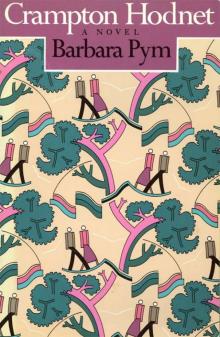 Crampton Hodnet
Crampton Hodnet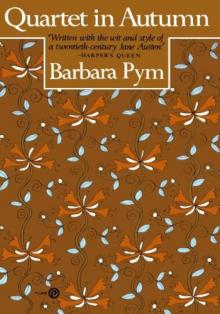 Quartet in Autumn
Quartet in Autumn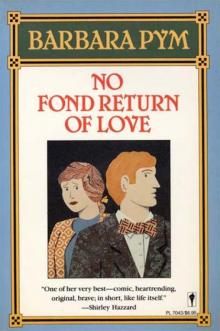 No Fond Return of Love
No Fond Return of Love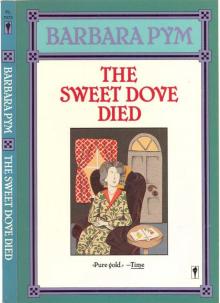 The Sweet Dove Died
The Sweet Dove Died Excellent Women
Excellent Women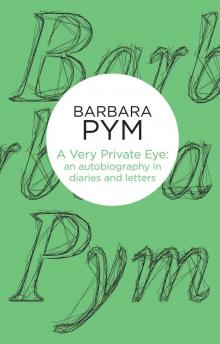 A Very Private Eye: The Diaries, Letters and Notebooks of Barbara Pym
A Very Private Eye: The Diaries, Letters and Notebooks of Barbara Pym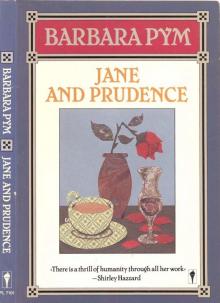 Jane and Prudence
Jane and Prudence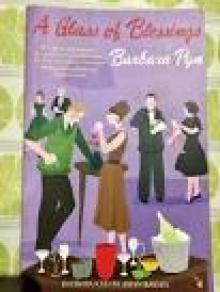 A Glass of Blessings
A Glass of Blessings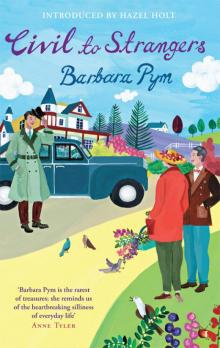 Civil to Strangers and Other Writings
Civil to Strangers and Other Writings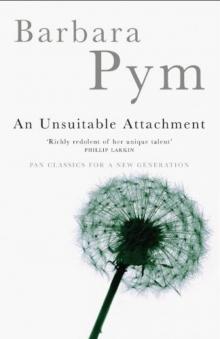 An Unsuitable Attachment
An Unsuitable Attachment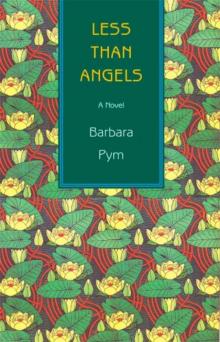 Less Than Angels
Less Than Angels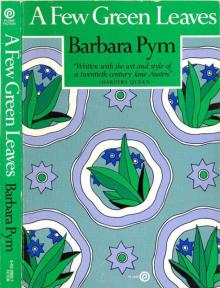 A Few Green Leaves
A Few Green Leaves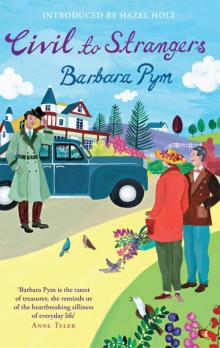 Civil to Strangers
Civil to Strangers